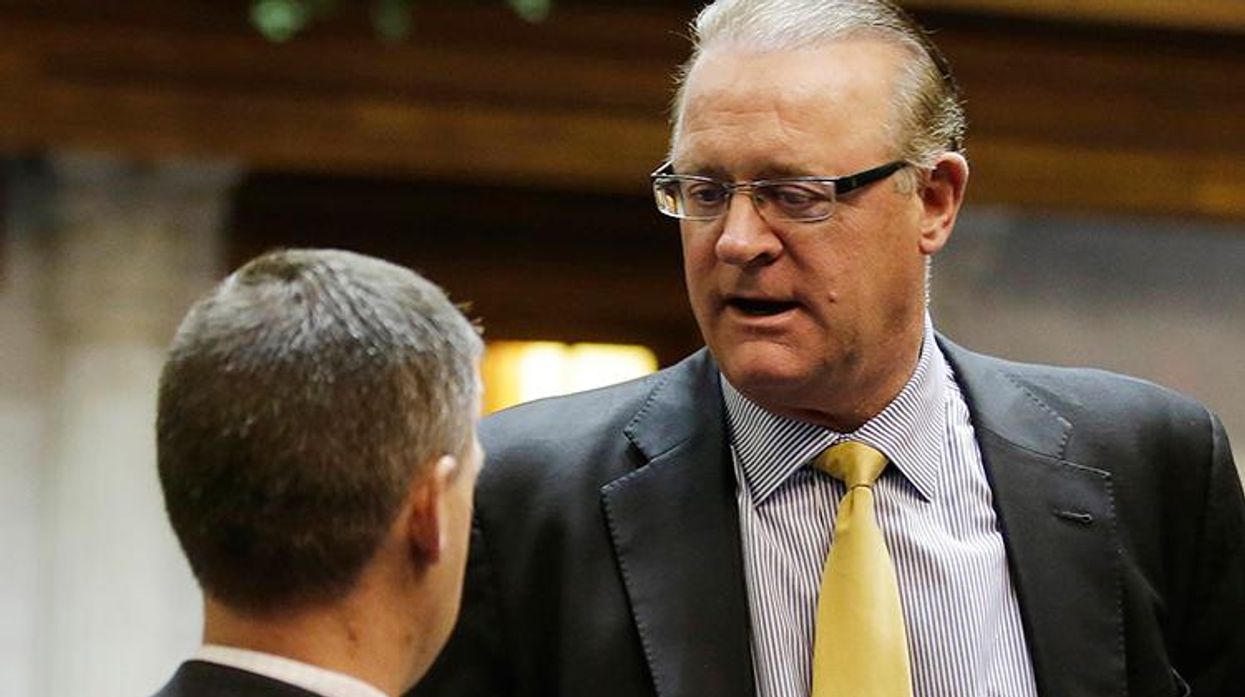Indiana Republican lawmakers have introduced a bill that would add sexual orientation and gender identity to state antidiscrimination law, but some activists say it would facilitate discrimination rather than prevent it.
At issue are the proposed law's broad religious exemptions, which would allow nonprofits and even some for-profit small businesses to avoid penalties for discrimination by citing faith-based objections to accommodating LGBT people -- making it, in a way, a resurrection of the "license to discriminate" law that raised such uproar earlier this year.
The bill, introduced Tuesday by Senate Republicans, would, among other things, "allow schools, employers and others to determine their own restroom policies for transgender people; businesses with fewer than four employees to refuse wedding services to same-sex couples; and religious-affiliated adoption agencies to reject prospective same-sex parents," The Indianapolis Star reports.
Also, notes ThinkProgress, the bill would prevent the state from denying contracts or grants to religiously affiliated groups that discriminate, or taking any other "discriminatory action" against them, effectively "[requiring] the state to subsidize discrimination, funding organizations with taxpayer money even if they refuse to serve same-sex couples equally." This approach is far different than the one taken in neighboring Illinois, which in 2011 ended the state's contract with Catholic Charities for adoption services because the group discriminated against same-sex couples.
"Religious organizations are specifically acknowledged to include adoption agencies, nonprofit schools, and any religiously-affiliated organization 'that provides social services or charitable services,'" ThinkProgress adds.
A key problem in the bill, according to ThinkProgress, is that these exemptions would apply only to the sexual orientation and gender identity provisions of the law, not to discrimination based on race, age, gender, or any other enumerated characteristic. Utah this year enacted an LGBT-inclusive law with broad religious exemptions, but the state had already applied those exemptions to other types of prohibited discrimination. However, "under Indiana's bill, LGBT people are very much singled out for less robust protection," the site points out.
The legislation would also impose a $1,000 penalty for filing "frivolous" discrimination complaints and would prevent cities and counties from enacting more stringent laws than the state one -- a tactic employed last year in Arkansas, where the governor allowed a law banning the passage of local nondiscrimination ordinances more stringent than statewide protections to become law.
Jennifer Pizer, Lambda Legal's law and policy project director, denounced the measure. "This bill is a wolf in sheep's clothing," she told the Star. "This doesn't protect LGBT people -- it is a road map for discrimination against LGBT people. It aims to guarantee the right of some medical, social services and other institutions to discriminate against married same-sex couples, and to do so with taxpayer dollars. It aims to write separate, lesser protections for LGBT people into state law."
The fact that Indiana law offers no protection at all against anti-LGBT discrimination has been the subject of much discussion ever since the state passed its Religious Freedom Restoration Act last spring. Many critics said the act amounted to a "license to discriminate," letting businesses and individuals turn away those who offended their religious sensibilities. After much outcry both within and outside the state, the legislature passed and Gov. Mike Pence signed a "fix" to the law aimed at assuring it would not supersede local nondiscrimination ordinances.
Senate President Pro Tempore David Long (above, right, with Sen. Jim Banks), described the bill introduced Tuesday as "an attempt to balance civil rights and religious liberty," according to the Star.
But it may well prove unsatisfactory, some observers said. "This is a starting point, but it's unlikely it will answer the concerns raised about LGBT rights at the end of last session," Robert Katz, a professor at Indiana University McKinney School of Law, told the paper.
It may have some difficulty winning support from Republicans, who hold a majority in both the House and Senate, as well as from Democrats, the Star notes. Some Republicans would prefer to do nothing on the issue, while Democrats want stronger protections for LGBT residents.
"Hoosiers do not condone discrimination and will not accept half measures or carve-outs," Tim Lanane, leader of the Senate's Democratic minority, told the newspaper, adding that he would study the bill.
A new poll does indicate majority, bipartisan support -- among citizens, if not lawmakers -- for expanding Indiana's nondiscrimination law to cover sexual orientation and gender identity. Results released Tuesday showed 55 percent of respondents in favor of such a move, consistent with another poll in June, the Star reports.
"This consistency indicates stability of opinion, with intensity definitely on the side of those who support this change," said Republican pollster Christine Matthews, who conducted the poll. It and the June poll were both commissioned by Bill Oesterle, the former CEO of Angie's List, himself a Republican and an outspoken critic of Pence and the state's RFRA.




































































Charlie Kirk DID say stoning gay people was the 'perfect law' — and these other heinous quotes